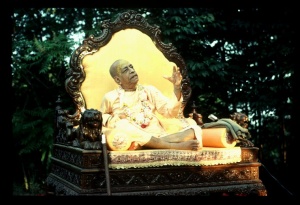SB 4.25.31

A.C. Bhaktivedanta Swami Prabhupada
TEXT 31
- tvad-ānanaṁ subhru sutāra-locanaṁ
- vyālambi-nīlālaka-vṛnda-saṁvṛtam
- unnīya me darśaya valgu-vācakaṁ
- yad vrīḍayā nābhimukhaṁ śuci-smite
SYNONYMS
tvat — your; ānanam — face; su-bhru — having nice eyebrows; su-tāra — with nice pupils; locanam — eyes; vyālambi — scattered; nīla — bluish; alaka-vṛnda — by locks of hair; saṁvṛtam — surrounded; unnīya — having raised; me — unto me; darśaya — show; valgu-vācakam — having words very sweet to hear; yat — which face; vrīḍayā — by shyness; na — not; abhimukham — face to face; śuci-smite — O woman with lovely smiles.
TRANSLATION
My dear girl, your face is so beautiful with your nice eyebrows and eyes and with your bluish hair scattered about. In addition, very sweet sounds are coming from your mouth. Nonetheless, you are so covered with shyness that you do not see me face to face. I therefore request you, my dear girl, to smile and kindly raise your head to see me.
PURPORT
Such a speech is typical of a living entity attracted by the opposite sex. This is called bewilderment occasioned by becoming conditioned by material nature. When thus attracted by the beauty of the material energy, one becomes very eager to enjoy. This is elaborately described in this instance of Purañjana's becoming attracted by the beautiful woman. In conditional life the living entity is attracted by a face, eyebrows or eyes, a voice or anything. In short, everything becomes attractive. When a man or a woman is attracted by the opposite sex, it does not matter whether the opposite sex is beautiful or not. The lover sees everything beautiful in the face of the beloved and thus becomes attracted. This attraction causes the living entity to fall down in this material world. This is described in Bhagavad-gītā (BG 7.27):
- icchā-dveṣa-samutthena
- dvandva-mohena bhārata
- sarva-bhūtāni sammohaṁ
- sarge yānti parantapa
"O scion of Bharata [Arjuna], O conqueror of the foe, all living entities are born into delusion, overcome by the dualities of desire and hate."
This condition of life is called avidyā. Opposed to this avidyā is real knowledge. Śrī Īśopaniṣad distinguishes between vidyā and avidyā, knowledge and ignorance. By avidyā (ignorance) one becomes conditioned, and by vidyā (knowledge) one becomes liberated. Purañjana admits herein that he is attracted by avidyā. Now he wishes to see the complete feature of avidyā and so requests the girl to raise her head so that he can see her face to face. He thus wishes to see the various features that make avidyā attractive.